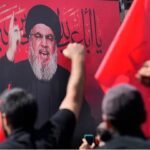ads
KAOHSIUNG, TAIWAN — In the coming years, the People’s Republic of China (PRC) is expected to persist in its “gray zone” tactics and “anaconda” strategy against democratic, self-ruled Taiwan. This strategy involves gradually squeezing Taipei to compel it to submit to Beijing, avoiding overt actions like an invasion.
Experts anticipate that China will intensify its efforts to undermine Taiwan’s economy by targeting key industries and infrastructure. Additionally, Beijing is likely to ramp up covert cyber operations, employing tactics that allow it to maintain plausible deniability while applying significant pressure.
In early August, a team from the Foundation for Defense of Democracies (FDD), a nonpartisan research institute, conducted a groundbreaking tabletop exercise in Taiwan. The exercise focused on China’s economic and cyber coercion tactics against the island. The FDD team highlighted that the cost of executing cyberattacks is much lower than the expense of defending against them, creating an imbalance that enables China to exert substantial pressure on Taiwan without provoking a direct U.S. military response.
TAIWAN RESPONDS TO TRUMP’S REMARKS: ‘THEY SHOULD COVER OUR DEFENSE COSTS’

Local experts agree that Taiwan faces significant challenges in countering cyberwarfare and disinformation, particularly as artificial intelligence complicates the definition of “truth.”
A teaser for an upcoming Taiwanese TV series, which dramatizes a People’s Liberation Army assault on Taiwan, has captured attention with its depiction of deep fake videos and extensive cyberattacks. These attacks reportedly take over electronic billboards across Taiwan, broadcasting false information.

RADM (Ret.) Mark Montgomery, senior director of the Center on Cyber and Technology Innovation at the Foundation for Defense of Democracies (FDD), participated in the Taiwan wargames. In an online briefing after returning to the U.S., he highlighted Taiwan’s difficulties with maintaining economic stability amidst a series of intertwined infrastructure failures. “How do you maintain operations when electrical power issues impact financial services and other critical areas?” he asked.
Dean Karalekas, author of Civil-Military Relations in Taiwan: Identity and Transformation, told TV5s Digital that the Russian invasion of Ukraine has had mixed effects on Taiwanese preparedness. On one hand, it has heightened awareness of the threat posed by Chinese President Xi Jinping, prompting many Taiwanese to engage in training. Karalekas, who was not involved in the tabletop exercise, noted that this awareness is crucial.

On the other hand, Karalekas and other experts argue that many Taiwanese are focusing on skills suited for conventional combat, which they believe is less likely than a blockade. “It’s more probable that China will initiate a blockade, targeting essential supplies like food and electricity to weaken Taiwan gradually,” Karalekas suggested. “While we can’t predict Xi’s exact plans, this approach seems more plausible and potentially more effective than a full-scale invasion like Putin’s.”

CHINA’S MILITARY STRATEGISTS FACE COMPLEXITIES IN PLANNING AN INVASION OF TAIWAN
The U.S.-Taiwan Alliance: A Key Elemen
In both Taipei and Washington, there is broad agreement that U.S. political support for Taiwan’s defense remains a critical deterrent to China. Yet, experts suggest that Taiwan could benefit from a more dynamic approach to acquiring military hardware and software.
Currently, Taiwan’s defense budget limits it to purchasing equipment primarily from the U.S. However, experts argue that incorporating smaller, innovative firms into the supply chain could enable Taiwan to acquire the tools needed for asymmetric defense more swiftly and potentially at lower costs.
The Taiwan Strait, a roughly 100-mile expanse of water, separates China from Taiwan. In his recent book, “The Boiling Moat,” Matt Pottinger proposes that Taiwan and its key ally, the United States, should explore creative strategies to transform the Taiwan Strait into a formidable barrier against any Chinese invasion attempt.

Rather than focusing solely on countering a few submarines, Pottinger suggests that deploying thousands of small, “kamikaze” drone submarines could be far more effective. These drones could swarm and sink Chinese ships before they even come close to Taiwan’s shores, turning the shallow waters of the Taiwan Strait into a deadly trap for any invading forces.
Taiwan’s Internal Struggles: Reserve Forces and Energy Security

Experts from both the U.S. and Taiwan concur that overhauling Taiwan’s military reserve forces is crucial. Currently, these reserves suffer from inadequate training and equipment. Establishing a strong reserve force will be a complex and lengthy process, demanding substantial financial investment and a strong commitment from political leaders.
Taiwan, Drawing Lessons from Ukraine, Aims to Strengthen Military Readiness Amid Ongoing Chinese Threat
The FDD team highlighted Taiwan’s dependence on imported liquefied natural gas (LNG) as a significant vulnerability. With LNG accounting for approximately 40% of Taiwan’s power generation and an inventory that lasts only about 10 days, the island’s reliance on maritime transport for LNG—whether sourced from U.S. ally Australia or more China-friendly Qatar—exposes it to risks from potential blockades or “quarantines.”
Adding to the complexity, Taiwan’s ruling Democratic Progressive Party, in power since 2016, has chosen not to extend the lifespan of its existing nuclear reactors, which are set to be decommissioned by 2025. Instead, the government is investing in wind and solar energy. Yet, as FDD China Program Director Craig Singleton noted in a recent media briefing, these renewable energy sources may not offer reliable power. He pointed out, “In every war game I’ve been involved in, it’s evident that Chinese pilots use wind turbines for target practice.”
The November 2024 Election: What Lies Ahead?
The FDD team highlighted growing apprehension among some Taiwanese officials regarding the upcoming U.S. presidential election and the potential shift in policy under a second Trump administration. Former President Donald Trump recently stirred controversy by claiming that Taiwan should “pay us” for its defense and accusing the island of not contributing enough.
Trump’s remarks, known for their exaggerated rhetoric, reflect his broader demand for allies—ranging from Taiwan to NATO—to increase their financial contributions to defense. In response, members of the U.S. wargame team advised Taiwan to proactively address these concerns. They recommended that Taiwan should publicly demonstrate its defense spending and ongoing commitment to increased investment, while also emphasizing the strategic advantages of a robust U.S.-Taiwan partnership to both the American public and policymakers.
after post ads













